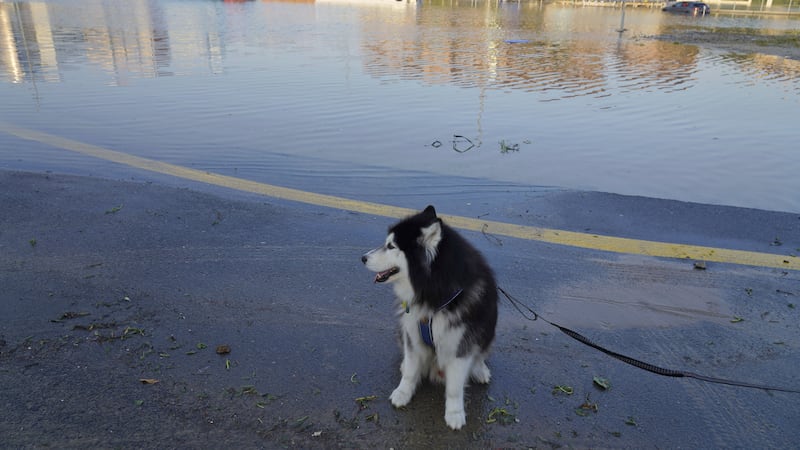Israel’s military announced it has withdrawn its forces from the southern Gaza city of Khan Younis, wrapping up a key phase in its ground offensive against the Hamas militant group and bringing its troop presence in the territory to one of the lowest levels since the six-month war began.
But defence officials said troops were merely regrouping as the army prepares to move into Hamas’s last stronghold, Rafah.
“The war in Gaza continues, and we are far from stopping,” said the military chief, Lt Gen Herzi Halevi.
Local broadcaster Channel 13 TV reported that Israel was preparing to begin evacuating Rafah within one week and the process could take several months.
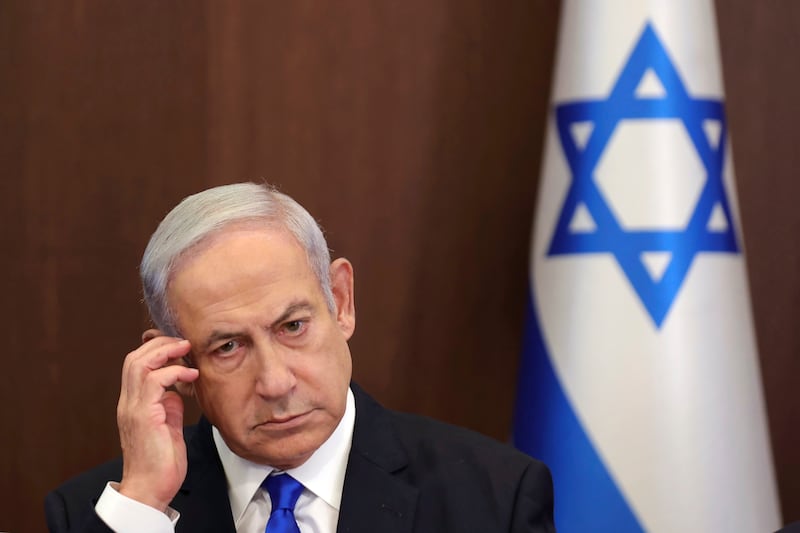
Still, the withdrawal was a milestone as Israel and Hamas marked six months of fighting. Military officials, speaking on condition of anonymity under army policy, said a “significant force” remained in Gaza with “freedom of action” to continue targeted operations including in Khan Younis, a Hamas stronghold and hometown of the group’s leader, Yehya Sinwar.
AP video in Khan Younis on Sunday showed some people returning to a landscape marked by shattered multi-storey buildings and climbing over debris to explore crumbled, dusty remains.
Israel has vowed a ground offensive on the southernmost Gaza city of Rafah, considered Hamas’s last stronghold, and Prime Minister Benjamin Netanyahu on Sunday told his Cabinet that victory means “elimination of Hamas in the entire Gaza Strip, including Rafah”.
But Rafah shelters some 1.4 million people – more than half of Gaza’s population. The prospect of an offensive has raised global alarm, including from top ally the US, which has demanded to see a credible plan to protect civilians. Allowing people to return to nearby Khan Younis could relieve some pressure on Rafah.
White House national security spokesman John Kirby told ABC the US believes that the partial Israeli withdrawal “is really just about rest and refit for these troops that have been on the ground for four months and not necessarily, that we can tell, indicative of some coming new operation for these troops”.
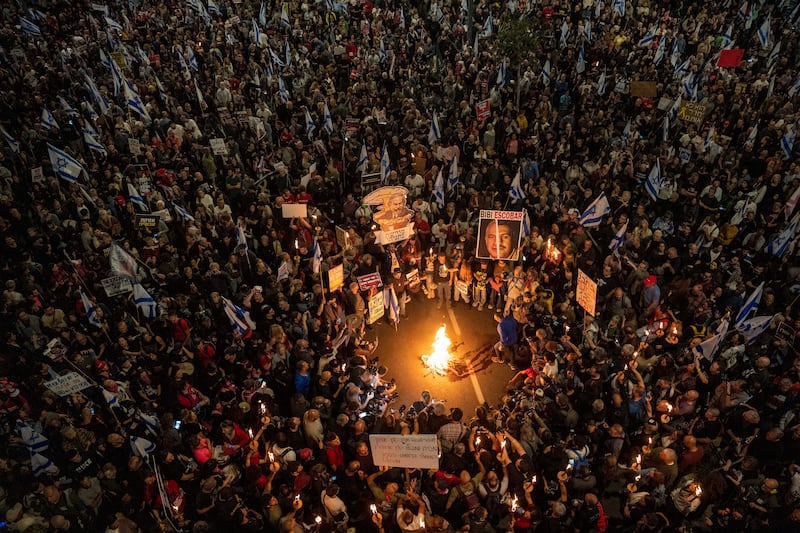
Israel’s military quietly drew down troops in devastated northern Gaza earlier in the war.
But it has continued to carry out air strikes and raids in areas where it says Hamas has resurfaced, including Gaza’s largest hospital, Shifa, leaving what the head of the World Health Organisation called “an empty shell”.
The six-month mark has been met with growing frustration in Israel, where anti-government protests have swelled and anger is mounting over what some see as government inaction to help free about 130 remaining hostages, about a quarter of whom Israel says are dead.
Hamas-led militants took about 250 captives when they crossed from Gaza into Israel on October 7 and killed 1,200 people, mostly civilians.
Several thousand protesters called for a “hostage deal now” at a rally outside the Knesset in Jerusalem, organised by hostages’ families.
Negotiations in pursuit of a ceasefire in exchange for the hostages’ release were expected to resume in Cairo on Sunday. An Israeli delegation led by the head of the Mossad intelligence agency was due to depart for Cairo, according to an Israeli official.
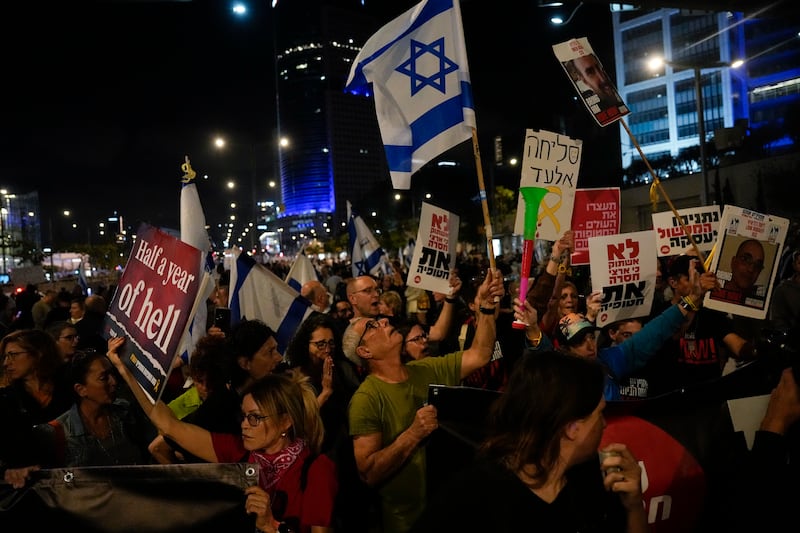
“Israel is prepared for a deal. Israel is not prepared to surrender,” Mr Netanyahu said, and asserted that international pressure on Israel “is only causing Hamas to harden its positions”.
Pressure rose for action now.
“This doesn’t seem a war against terror. This doesn’t seem anymore a war about defending Israel. This really, at this point, seems it’s a war against humanity itself,” chef Jose Andres told ABC, days after an Israeli air strike killed seven of his World Central Kitchen colleagues in Gaza.
Aid deliveries on a crucial new sea route to the territory were suspended.
“Humanity has been all but abandoned” in Gaza, the International Federation of Red Cross and Red Crescent Societies said in a statement marking six months of war.
The UN and partners now warn of “imminent famine” for more than one million people in Gaza as humanitarian workers urge Israel to loosen restrictions on the delivery of aid overland, the only way to meet soaring needs as some Palestinians forage for weeds to eat.
It's has been six months since the dramatic escalation of hostilities in Israel and Palestine resulting in unbearable pain and suffering.
The @IFRC has supported both @Mdais, in Israel, and the @PalestineRCS through months of catastrophic and ever-escalating violence and hunger.… pic.twitter.com/FfyQDmP8rw
— IFRC (@ifrc) April 7, 2024
Mothers who have given birth in Gaza since the war began are especially vulnerable.
The Health Ministry in Gaza said the bodies of 38 people killed in Israel’s bombardment had been brought to the territory’s remaining functional hospitals in the past 24 hours.
It said 33,175 have been killed since the war began. It does not differentiate between civilians and combatants but says two thirds of the dead are children and women.
Israel’s military continued to suffer losses, including in Khan Younis, where the military said four soldiers were killed.
More than 600 Israeli soldiers have been killed since October 7, including 260 in the Gaza ground operation, according to Israel’s government.
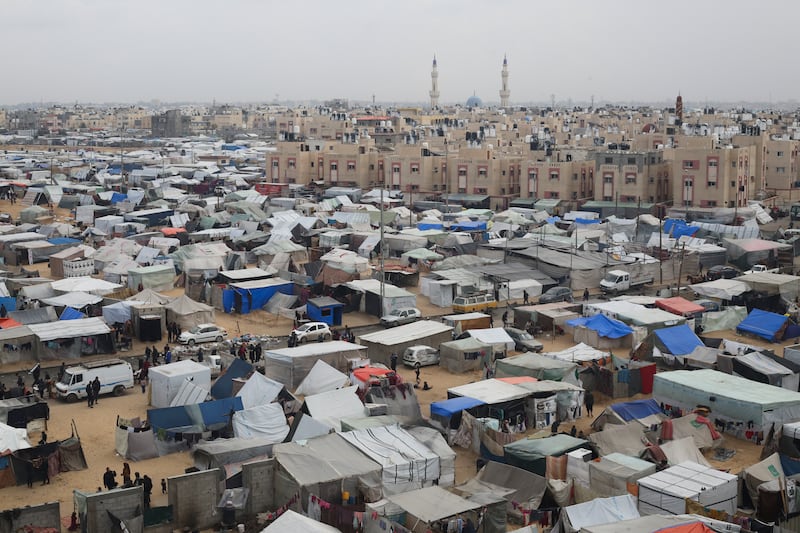
Concerns about a wider regional conflict continued as a top Iranian military adviser warned Israel that none of its embassies were safe following last week’s strike in Damascus – blamed on Israel – that killed two elite Iranian generals and flattened an Iranian consular building.
“None of the embassies of the (Israeli) regime are safe anymore,” General Rahim Safavi, a military adviser to Iran’s supreme leader Ayatollah Ali Khamenei, was quoted as saying by the semi-official Tasnim agency.
Israel has not directly acknowledged its involvement. Mr Netanyahu said Israel was prepared for any response.
“Whoever harms us or plans to harm us, we will harm them,” he said.

